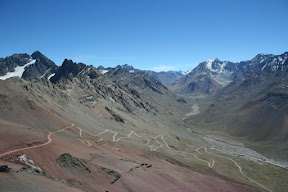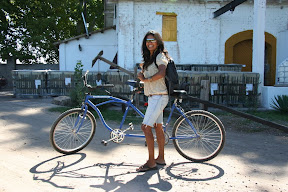 |
| From Mendoza and P... |
I must confess that the mini bus style of trip isn't my favourite, but maybe tomorrow we'll get out for a walk. It's not as easy here as the mountains are further away and seem to require guides.
The day before yesterday we went on a tour of some of the Vineyards and wineries near Mendoza. We managed to find a tandem to hire once again and set off, map in hand, to see what we could find to taste. The first bodega we came to was a modern winery called Tempus Alba with large stainless steel vats, computer controlled temperatures and such like. While not being particularly romantic, it did serve to enlighten us to the ways of modern wine production. I have to say that the 7 peso glass ofCaberbet Sauvignon that we tried wasn't really much to write home about. The next place was far more interesting, being one of the oldest bodegas in the area. It originally belonged to the Guevarra family (no relation to El Famoso Rebelde), then it passed to a Basque wine company called Euskadi before being partly bought back by the Tomaso family. This had rows of vast round brick vats of two stories; the top for fermentation and the bottom for storage. The original owner had bricks shipped from the UK, cement from Germany and builders from Spain to create the vats, which withstood a terrible earthquake which levelled the rest ofMendoza. Nowadays these are used for storing wine bottles since the fermentation takes place offsite. Our tour, which cost 10 pesos each, finished with a tasting of five of the famliy wines, including the desert wine made to the grandmother's secret recipe! Yum. We ended up buying a bottle of their Malbec wine, which we consumed later with our dinner. We had time to visit one more bodega before merrily riding back to the hire place, depositing the trusty tandem and jumping on a bus back to Mendoza.
 |
| From Mendoza and P... |
On wine making:
Just in case you were wondering, or indeed thinking of setting up you rown bodega or vinyard, this is what I learned about wine making. First you harvest the grapes (no shit Sherlock) and remove them from the stalks (by ´aaand), taking time to remove the damaged or rotten ones. Then you put them in a big vat with yeast where the skin and seeds separate out from the juice and pulp. This has to be at a carefully controlled temperature depending on the grape variatal for it to work. The seeds and the skin are what give the body and the tannin to the wine so you leave it to circulate and gather itself. Then you drain off the juice and leave it for a time to mature. In good wines this is in Oak barrels, with French oak being preferred to American. The newer the barrel the more oaky flavour and body you get. If a bottle says 'Roble' on it then it's been in a brand new barrel. The barrels are used for up to four years before being recycled into Parque flooring, furniture or for making Whiskey (yum). The wine is transferred into bottles and left for another year before being sold. The reason you see 'crianza' on some wines is because it is the second use of the barrel, and as the barrel ages it needs constant attention to stop cracks and thus air getting into the wine. The word crianza is spanish for a young baby, hence somethingthat required a lot of care."


No comments:
Post a Comment